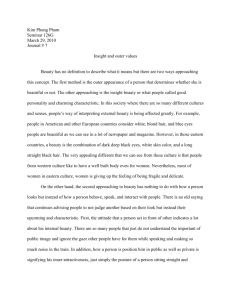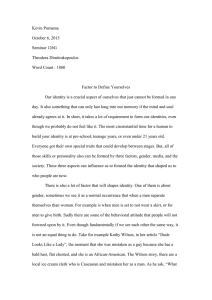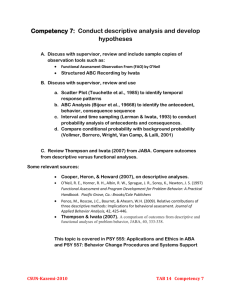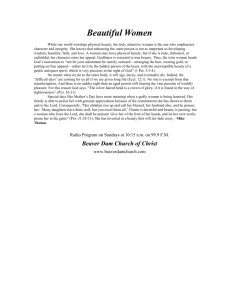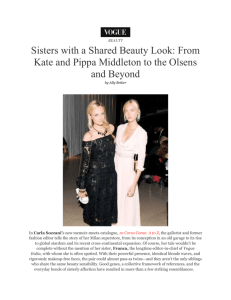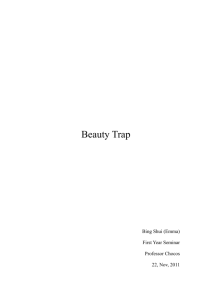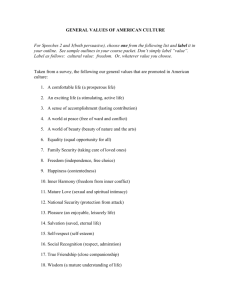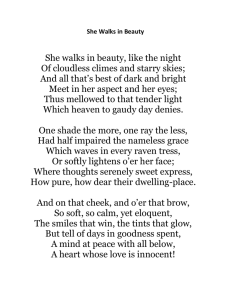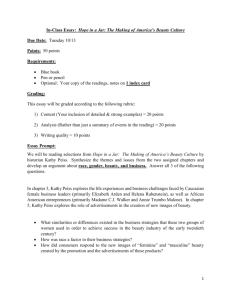seminar1stdraft
advertisement
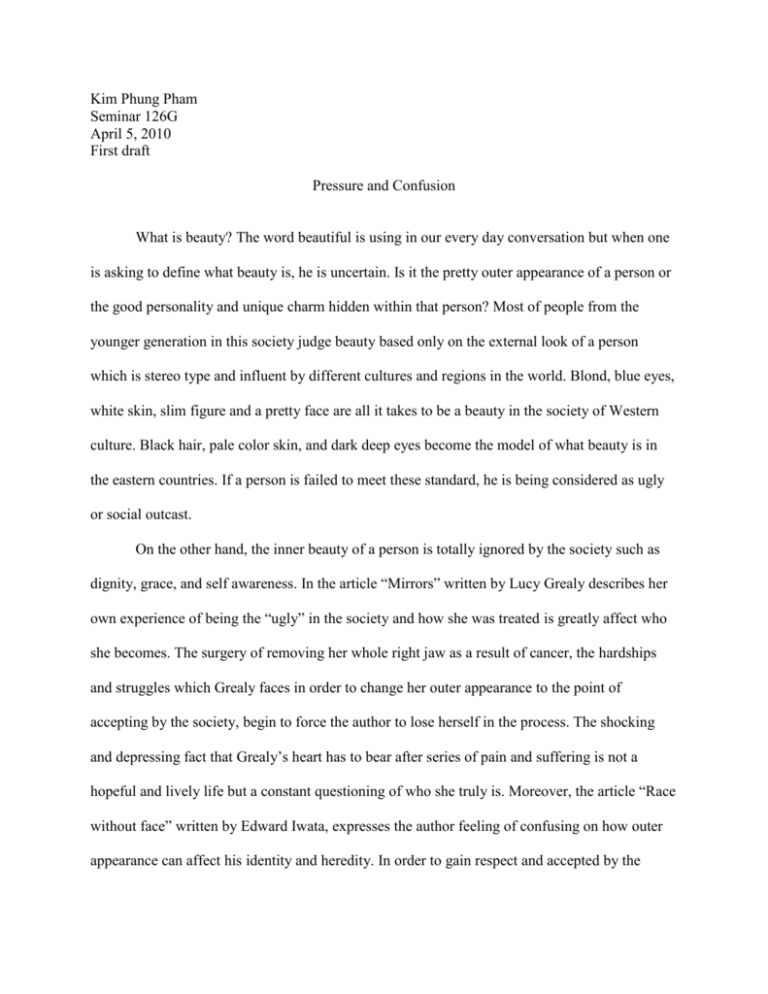
Kim Phung Pham Seminar 126G April 5, 2010 First draft Pressure and Confusion What is beauty? The word beautiful is using in our every day conversation but when one is asking to define what beauty is, he is uncertain. Is it the pretty outer appearance of a person or the good personality and unique charm hidden within that person? Most of people from the younger generation in this society judge beauty based only on the external look of a person which is stereo type and influent by different cultures and regions in the world. Blond, blue eyes, white skin, slim figure and a pretty face are all it takes to be a beauty in the society of Western culture. Black hair, pale color skin, and dark deep eyes become the model of what beauty is in the eastern countries. If a person is failed to meet these standard, he is being considered as ugly or social outcast. On the other hand, the inner beauty of a person is totally ignored by the society such as dignity, grace, and self awareness. In the article “Mirrors” written by Lucy Grealy describes her own experience of being the “ugly” in the society and how she was treated is greatly affect who she becomes. The surgery of removing her whole right jaw as a result of cancer, the hardships and struggles which Grealy faces in order to change her outer appearance to the point of accepting by the society, begin to force the author to lose herself in the process. The shocking and depressing fact that Grealy’s heart has to bear after series of pain and suffering is not a hopeful and lively life but a constant questioning of who she truly is. Moreover, the article “Race without face” written by Edward Iwata, expresses the author feeling of confusing on how outer appearance can affect his identity and heredity. In order to gain respect and accepted by the Pham white society, the author choose to undergo a plastic surgery to change his face and try to become a white people. Therefore, both of these authors demonstrate how powerful the society pressure can affect a person’s decision. The society is obsessed with the outer appearance which causes the author to continue taking chance on having plastic surgeries, the total of twenty surgeries within ten years. These surgeries are not for the purpose of achieving extraordinary beauty but to make one become more human, more normal in the eyes of other people. As each of them passed by without a positive result, her hope shrinks along with her self-esteem. Yet, people around do not understand the difficulties and only use her appearance to judge who Grealy is. The worse scenario is that she is no longer a human being in their eyes but an object to stare and make comment at. Grealy states in her work: “People stared at me in stores, other children made fun of me to the point where I came to expect it constantly, wherever I went” (59), the author emphasizes how heartless and ignorant these people are to laugh at other people’s defect without knowing the reason behind. Grealy does not choose to be an ugly person but the cancer causes her to remove her right jaw and become deformed from normal people. Do people expect the author to explain every single time the reason why her face is disoriented in order to be friend or just to not be tease by them. These three words, wherever I went, greatly highlights the author disappointed in other people for only see her based on her appearance instead of her good personalities. As a result, the society obsession of external look frustrates people’s heart when they are misfit in these qualifications of beauty. The society pressure of how beauty is also become the knife that hurts and scars people like Grealy or with similar deform as her. The author has written: “I was a dog, a monster, the Pham ugliest girl they had ever seen” (Grealy, 60). It is already a sin for a person to compare herself with other people because their genes and upbringing are different from each other. In addition, those obstacles that each person facing shapes their inner soul, create a unique characteristic just for that person. As a result, there are different types of beauty and neither of them is superior to the other? Yet the author does not compare herself to other human but to an animal, a monster. The author is being convinced by the power force, the numerous people in this society, as a misfit and abnormal. Just by the structure and word choice of the sentence, the author show how much she has suffered from other people remark about her face and her defection. It has already gone to the point of beyond depression, it is hopelessness. The constant remarks and jokes of other people have turned even the author to doubt her existence as a human being. Being blind by the outer appearance, people are unable to see the real beauty of a person, her heart and soul. Most of the student in the author’s high school did not know the sweet and kind girl behind that disoriented face. Even though she is being treated as something that is disgusting and eyesore, she is still considering other people before her own. The author reveals: “‘Hey, look, it is Jerry’s girlfriend,’ they yelled when they saw me, and I felt such shame, knowing that this was the deepest insult they could throw at Jerry.” (Grealy, 60) the shame that Grealy mention here is not the shame that she is feeling but the shame that Jerry feel for being teased as a partner with her. The author does not care about the fact that she is being used as a subject to insult other people but instead worry about the boy named Jerry. How horrible he felt to be pair with someone like her. The continuous depression are shown when the author emphasizes it is the “deepest insult they could throw at him”, the author is acting as if it is not bother her at all while she is struggling with her own anger and confusion. Therefore, Grealy’s Pham considerable characteristic has been totally ignored by student in her school because of her outer appearance. Consideration is not the only beauty that Grealy behold; appreciation is also another great personality that makes the author beautiful. Despite having such a harsh childhood for become the constant target of all the outrageous insult and painful treatment, Grealy thanks for the fact that she can live and enjoy what she has what she affirms: “I was often miserable, but I knew that to feel warm instead of cold was its own kind of joy, that to eat was a reenactment of the grace of some god whom I could only dimly define, and that simply to be alive was a rare, ephemeral miracle” (60). The pain and suffering that the author bear are immeasurable for which it is both physical and psychological. The chemotherapy exhausts the author’s physical strength; she could only be well in her body for once in a week. Moreover, the expectation and disappointed feeling that the author experiences from her family is even more significant. The question of how can a nine year old girl worry about her parents and doctor’s anticipation more than the pain she feel from getting injection. These show how much the author appreciates for able to feel well and have a good health. Social pressure does not only affect people decision, it even forced people to change their appearance as well as identity in order to be accepted. Even after World War II ended, Japanese Americans are still being seen as traitors and the hostile against them are still high in the United States. People did not accept or appreciate the effort that Japanese Americans put in to live an equal life with normal American. They are being treated as if they are inferior to the society, especially to the white people as Iwata says: “the rest of us are too reserved and opinion less in the white world” (66). Iwata has his identity as a Japanese American because people are looking Pham down on him and judge him by his race as Asian. Therefore, Iwata believe that the only way for him to be accepted is to become a white person. As a result, Iwata has undergone a plastic surgery to change his face. Therefore, the society sometime affects people’s way of thinking in a negative ways that they lose their own root and make erroneous decision. Fortunately, Iwata has the chance to find out who he really is and what the values of his own culture and people are after going back to Manzanar and Japan. Iwata quote a line from a book written by John Okada: “if he was to find out his way back to that point of wholeness and belonging, he must do so in the place where he had begun to lose it” (68) which clearly emphasizes how he reach the beauty of his heart and soul. The author has never been in Japan for his whole childhood and barely experiencing the culture of his own inheritance. As a result, he want to blend into white culture and become one when not understand the value of his own heredity. Nevertheless, after arriving in Japan, Iwata is able to experience the feeling of accepting and respecting from his people. The more he comes into contact with the Japanese culture, the more understanding of life and hidden strength awakes inside him. Ultimately, at the end of his visiting in Japan, the author realize the beautiful and precious his culture and tradition to his own people as a whole and to himself as an individual. Despite his discovery of culture value, Iwata still cannot go back to who he really is because he has disowned his heritage by fixing his image to look like an American. The decision was made in a lack of knowledge mind which causes the author to regret so much later in his older age. The author expresses his unhappiness on his action through: “the faces rushing toward me in my presurgical daze were neither white nor yellow. They were mine” (Iwata, 70). The white face that rushes toward the author before the surgery is his desire to become American and Pham accept by the society even if he has to give up on his racial. On the other hand, the yellow face represents the hidden desire of wanting to keep his own culture and live true to his natural. Consequence, Iwata become conscious that they are all him; he is the mixed of two beautiful culture and are all important to prove who he really is. Social pressure has major impact on the decision making and on the identity of a person. Grealy decide to suffer the pain of twenty plastic surgeries to have the outer appearance that can be accepted by the society. She is convinced by the ignorant people that she is not a human, some kind of machine which needs to be fixing to become a real human. People refuse to see the inside beauty of Grealy because they are too busy to worry about the look of the person they talk to, in Grealy case is a disfigured face. Besides, Iwata is look down by the society not because of his detect, but because of his identity as a Japanese American after World War II. All of the confusions of whether to assimilate into the white culture to be accepted or to remain his own inheritance in this society force the author to undergo a plastic surgery in order to change his facial appearance. By changing his face, the author wants to deny his own race as well as culture to only feel regretted for his own decision. He is the son of two beautiful cultures and each of them is equally valuable and should not be ignore. Therefore, people are making decision are under a lot of pondering and social stress is one of the most magnificent impact. Pham Works Cited Lucy, Grealy. “Mirrors”. Print. Iwata, Edward. "Race without face." San Francisco Focus. (1991): Print.
